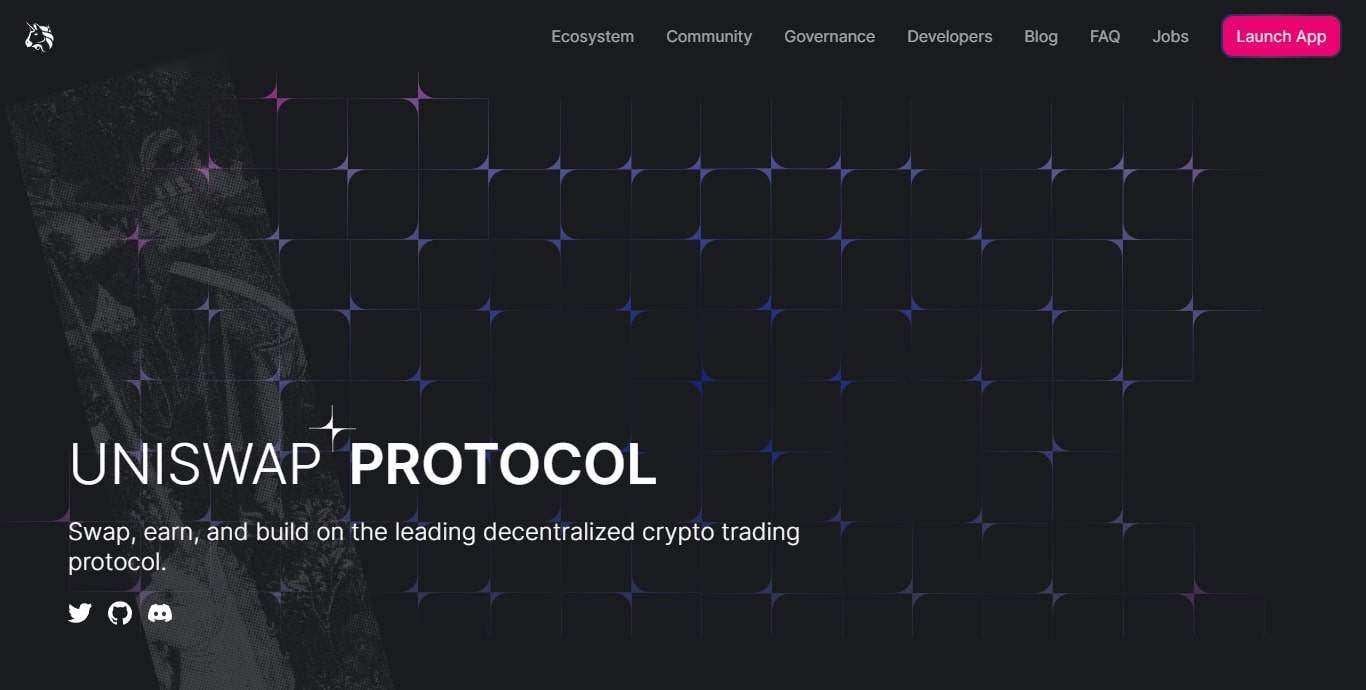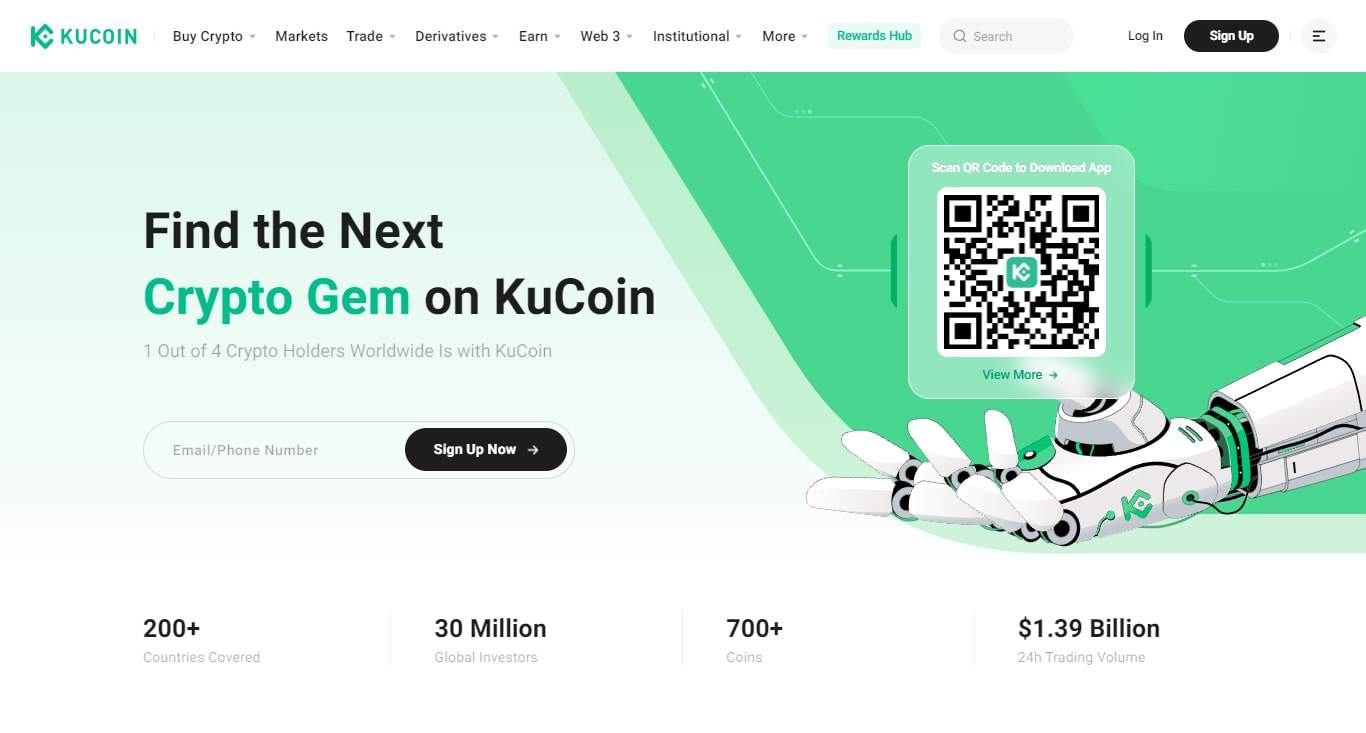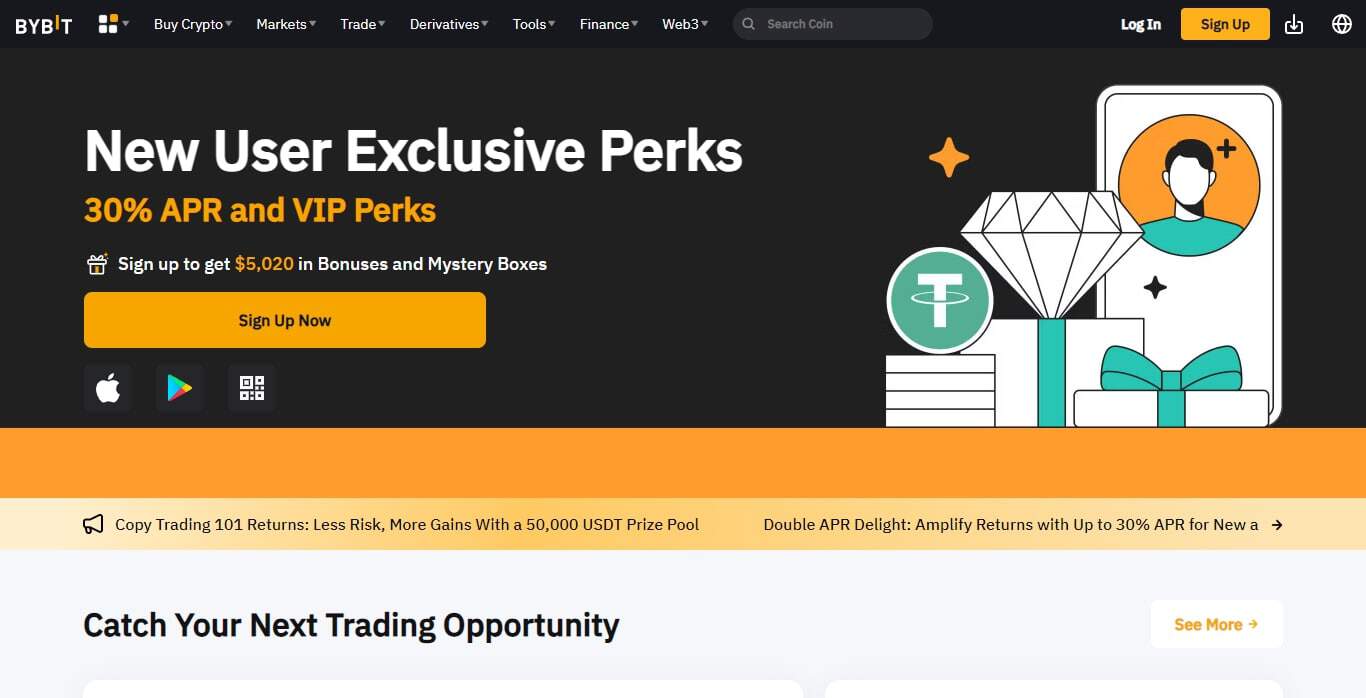In an era where digital privacy is paramount, cryptocurrency traders are increasingly seeking platforms that offer anonymity and security without compromising on features and usability. Recognizing this need, we have meticulously curated a list of the top 10 anonymous cryptocurrency exchanges, each with its unique strengths and offerings.
Our selection criteria are rigorous and multifaceted, focusing on aspects like privacy features, security measures, user interface, range of supported cryptocurrencies, and overall trading experience. Whether you’re a seasoned trader or just starting, this guide aims to provide valuable insights into the world of anonymous cryptocurrency trading.
Best Anonymous Cryptocurrency Exchanges for 2024
- Best for Instant Crypto Swaps: Changelly
- Best for Comprehensive DeFi Services: OKX
- Best for Altcoin Variety: PancakeSwap
- Best for Decentralized Token Swaps: Uniswap
- Best for Decentralised and Private Trading: Bisq
- Best for User-Friendly Interface: SimpleSwap
- Best for Trading Options: dYdX
Why Trust Crypto Head
We have been committed to providing our readers with well-researched, unbiased, and reliable information since 2017. Our team consists of crypto experts who understand the importance of choosing the right exchange.
We have spent a huge amount of time over the years evaluating and comparing a range of crypto platforms. We use a rigorous methodology to evaluate each platform, considering factors like security, user experience, and fees.
226
Exchanges considered
141
Exchanges analysed
9,165
Data points collected
1. Changelly - Best for Instant Crypto Swaps
Trading Fees
0.08% - 0.10%
Supported Crypto
744+
Supported Fiat Currencies
USD, AUD, GBP, CAD, EUR, NZD + 100 others Some through third party apps.
Changelly stands out as a unique and versatile player in the cryptocurrency exchange market. Its distinguishing feature is the ability to offer direct crypto-to-crypto exchanges, making it highly appealing for those seeking quick and straightforward trading options.
Changelly is recognized for its wide range of supported cryptocurrencies and its simplicity, making it an excellent choice for beginners. The platform’s integration with multiple wallet services enhances user convenience, allowing for seamless transactions directly from a personal wallet.
The absence of a traditional trading interface positions Changelly as a hassle-free option for users looking to trade without the complexities of standard exchange platforms, making it ideal for quick and direct cryptocurrency exchanges.

Changelly is a crypto exchange platform that was established in 2015, quickly gaining popularity due to its distinctive approach to crypto trading. The platform allows users to exchange one cryptocurrency for another without the need for a conventional trading interface, simplifying the process significantly.
One of Changelly’s main advantages is the support of over 744+ cryptocurrencies, offering a wide array of options for traders. It caters well to those who prefer direct swaps between different digital currencies without the need for fiat transactions.
The fee structure on Changelly is transparent, with a fixed 0.08% - 0.10% fee for all crypto-to-crypto trades. This simplicity in pricing is highly appreciated by users who prefer straightforward transactions.
Changelly’s security measures are robust, ensuring the safety of transactions. However, as it operates differently from traditional exchanges, it does not hold user funds, which significantly reduces the risk of security breaches.
Additionally, the platform is known for its ease of use, with a user-friendly interface and the option to integrate with various popular wallet services for seamless trading.
| Type | Fee |
|---|---|
| Deposit Fee (Bank Transfer) | 1% - 7% |
| Deposit Fee (Credit/Debit Card) | 1% - 7% |
| Trading Fee | 0.08% - 0.10% |
| Withdrawal Fee (Bank Transfer) | Not Listed |
2. OKX - Best for Comprehensive DeFi Services
Trading Fees
0.08% - 0.10%
Supported Crypto
320+
Supported Fiat Currencies
USD, AUD, GBP, CAD, EUR, NZD + 85 others Some through third party apps.
OKX is chosen for its impressive global presence and comprehensive offerings in the cryptocurrency exchange market. Established as a one-stop platform, OKX caters to both beginners and advanced traders with its diverse range of trading options
What sets OKX apart is its commitment to innovation and user experience. The platform offers unique features like DeFi integration, staking, and a native token (OKB), which provides users with trading fee discounts and other benefits.
OKX’s robust security protocols, combined with a user-friendly interface, make it a secure and appealing choice for traders worldwide. Its support for a wide array of cryptocurrencies and competitive fees position it as a leading exchange for those seeking a comprehensive and versatile trading platform.

OKX, formerly known as OKEx, is a significant player in the global cryptocurrency exchange landscape. Founded in 2017, the platform has rapidly expanded its offerings to include a vast range of cryptocurrencies, supporting over 320+ different digital assets.
The platform excels in providing a variety of trading options, catering to the needs of diverse traders. OKX also integrates DeFi applications, allowing users to access decentralized finance services directly through the exchange.
In terms of fees, OKX operates on a tiered structure where fees vary based on the user’s trading volume and OKB token holdings. The trading fees are competitive, with 0.08% - 0.10% being the standard rate, making it an attractive option for high-volume traders.
Security is a top priority for OKX. The exchange employs industry-leading security measures, including SSL encryption, cold storage of assets, and two-factor authentication (2FA) to ensure the safety of user funds and data.
One unique feature of OKX is its native token, OKB, which not only offers trading fee discounts but also gives users voting rights in the platform’s development decisions. This approach enhances community engagement and gives users a stake in the platform’s future.
The user interface of OKX is well-designed, offering a seamless experience for both novice and experienced traders. The platform also provides excellent customer support, with a responsive team available to assist users round the clock.
| Type | Fee |
|---|---|
| Deposit Fee (Bank Transfer) | Depends On the Country |
| Deposit Fee (Credit/Debit Card) | 0% |
| Trading Fee | 0.08% - 0.10% |
| Withdrawal Fee (Bank Transfer) | 0% via P2P |
3. PancakeSwap - Best for Altcoin Variety
Trading Fees
0.25%
Supported Crypto
1647+
Supported Fiat Currencies
USD, AUD, GBP, CAD, EUR + 7 others Some through third party apps.
PancakeSwap is selected for its unique position as a decentralized exchange (DEX) built on the Binance Smart Chain (BSC). It’s known for offering a different experience compared to traditional centralized exchanges, focusing on user autonomy and reduced transaction fees.
The platform stands out for its yield farming and liquidity pools, appealing to users interested in decentralized finance (DeFi) opportunities. PancakeSwap’s user-friendly interface and integration of advanced trading features make it accessible to a broad audience, from DeFi enthusiasts to those new to decentralized exchanges.

PancakeSwap, launched in 2020, quickly rose to prominence in the DeFi space. Operating on the Binance Smart Chain, it offers significantly lower transaction fees compared to platforms on Ethereum, attracting a substantial user base.
The exchange supports a diverse range of tokens, primarily those within the BSC ecosystem. It’s particularly noted for its Automated Market Maker (AMM) model, allowing users to trade directly from their wallets without the need for an intermediary.
One of the main attractions of PancakeSwap is its liquidity pools and yield farming options, providing users opportunities to earn rewards by staking tokens. This feature has made it a popular choice among DeFi enthusiasts.
PancakeSwap also incorporates features like a lottery system and NFT marketplace, adding to its diverse offerings. The platform continuously updates and introduces new services, keeping the user experience fresh and engaging.
Security on PancakeSwap is robust, with regular audits conducted to ensure the safety and integrity of the platform. However, as with all DEXs, users should exercise due diligence and understand the risks associated with DeFi platforms.
In terms of user support, PancakeSwap offers extensive resources and a community-driven support system, facilitating user engagement and assistance.
| Type | Fee |
|---|---|
| Trading Fee | 0.25% |
4. Uniswap - Best for Decentralized Token Swaps
Trading Fees
0.30%
Supported Crypto
1786+
Supported Fiat Currencies
USD, AUD, GBP, CAD, EUR, NZD + 33 others Only supports fiat currencies through third party apps.
Uniswap has been chosen for its pioneering role and dominant presence in the decentralized exchange (DEX) landscape. Built on the Ethereum blockchain, it stands out for its automated liquidity protocol, revolutionizing the way users trade cryptocurrencies without a traditional centralized intermediary.
The platform is highly regarded for its permissionless nature, allowing anyone to list tokens and provide liquidity. This openness has made Uniswap a hub for a wide variety of ERC-20 tokens, attracting a diverse user base. Its simplicity and integration of advanced trading features cater to both new entrants in DeFi and experienced traders.

Since its inception in 2018, Uniswap has become synonymous with decentralized finance (DeFi). As an Automated Market Maker (AMM), it allows users to swap a wide range of Ethereum-based ERC-20 tokens directly from their wallets.
Uniswap’s model is based on liquidity pools where users can contribute tokens to a pool and earn trading fees as liquidity providers. This feature not only incentivizes users but also solves the liquidity issue common in decentralized environments.
The platform supports a significant number of tokens and is often among the first to list emerging DeFi tokens, making it a go-to place for accessing new and innovative projects.
Regarding fees, Uniswap charges a flat 0.30% fee for each trade, which is distributed to liquidity providers. This fee structure is transparent and consistent across all pairs.
Security is a key aspect of Uniswap, with the protocol undergoing regular audits and updates to ensure the highest level of safety for its users. However, users are advised to be cautious, especially when interacting with less-known tokens due to the permissionless nature of the platform.
User support and resources are primarily community-driven, with extensive documentation and an active community available to assist users in navigating the platform.
| Type | Fee |
|---|---|
| Trading Fee | 0.30% |
5. Bisq - Best for Decentralised and Private Trading
Trading Fees
0.15% - 1.15%
Supported Crypto
13+
Supported Fiat Currencies
USD, AUD, GBP, CAD, EUR, NZD + 10 others Some through third party apps.
Bisq is selected for its unique position as a fully decentralized, peer-to-peer (P2P) exchange that operates without a central authority. This open-source platform appeals to users who prioritize privacy and security, offering a way to exchange cryptocurrencies in a trustless environment.
Its focus on user privacy, with no need for identity verification, makes Bisq a standout choice for those seeking anonymity in their transactions. The platform supports a variety of payment methods, enhancing its accessibility and convenience for users globally.

Bisq, previously known as Bitsquare, is an open-source desktop application, allowing users to buy and sell cryptocurrencies in a decentralized manner. Launched in 2014, it has carved out a niche for itself among users who value privacy and decentralization.
The platform supports a wide range of cryptocurrencies and numerous fiat payment methods, making it versatile for diverse trading needs. Its decentralized nature means that trades are conducted directly between users, with the platform merely functioning as an arbitrator.
Transactions on Bisq are secured using multi-signature wallets and security deposits, which help in preventing fraud and resolving disputes. This setup ensures a high level of security and trust in the trading process.
Fees on Bisq are relatively low and are paid in Bitcoin. The fee structure is designed to be simple and transparent, encouraging more users to participate in the network.
User experience on Bisq might have a steeper learning curve compared to centralized exchanges, but it remains a favored choice for those who prioritize privacy and wish to avoid the bureaucracy often associated with traditional exchanges.
The support and development community behind Bisq is active and committed to maintaining its ethos of decentralization and privacy, continually working on improvements and updates to the platform.
| Type | Fee |
|---|---|
| Trading Fee | 0.15% - 1.15% |
6. SimpleSwap - Best for User-Friendly Interface
Trading Fees
Not Listed
Supported Crypto
1000+
Supported Fiat Currencies
USD, AUD, CAD, EUR + 14 others Only supports fiat currencies through third party apps.
SimpleSwap has been chosen for its commitment to simplicity and ease of use in the cryptocurrency exchange market. As an instant cryptocurrency exchange, it offers a streamlined and user-friendly platform for quick and hassle-free crypto swaps.
The platform stands out for not requiring user registration or account creation, making it highly accessible for those seeking quick transactions with minimal setup. SimpleSwap’s support for a wide range of cryptocurrencies, including major coins and altcoins, caters to a diverse range of user preferences.

Launched in 2018, SimpleSwap has made a name for itself as a user-friendly and efficient platform for instant cryptocurrency exchanges. It allows users to swap cryptocurrencies directly, bypassing the need for complex trading interfaces.
SimpleSwap supports a vast array of cryptocurrencies, giving users the flexibility to trade between different digital assets easily. The platform does not impose limits on the amount for exchanges, offering freedom and flexibility in trading volumes.
One of the key features of SimpleSwap is its non-custodial nature, meaning that it doesn’t hold user funds. This approach minimizes security risks and ensures that users maintain control over their cryptocurrencies.
The exchange operates on a fixed-rate and floating-rate basis for transactions, providing options to users based on their preference for rate stability or potential market advantages.
Customer support on SimpleSwap is commendable, with a responsive support team available to assist users with any queries or issues. This focus on customer service enhances the overall user experience on the platform.
Given its straightforward approach and commitment to ease of use, SimpleSwap is an excellent choice for those who prefer quick and uncomplicated cryptocurrency exchanges.
| Type | Fee |
|---|---|
| Deposit Fee (Bank Transfer) | 4.95% |
| Deposit Fee (Credit/Debit Card) | 4.95% |
| Trading Fee | Not Listed |
| Withdrawal Fee (Bank Transfer) | Not Listed |
7. dYdX - Best for Trading Options
Trading Fees
0.02% - 0.04%
Supported Crypto
37+
Supported Fiat Currencies
USD, AUD, GBP, CAD, EUR + 26 others Only supports fiat currencies through third party apps.
dYdX is selected for its innovative approach as a decentralized platform offering advanced trading features. Built on the Ethereum blockchain, it caters to traders looking for a decentralized solution to access more complex trading options.
The platform is notable for its non-custodial structure, ensuring that users maintain full control over their funds. This aspect, combined with the ability to execute advanced trading strategies in a decentralized environment, makes dYdX particularly appealing to experienced traders in the DeFi space.

dYdX, established in 2017, has quickly become a prominent player in the decentralized finance (DeFi) market. The platform operates entirely on-chain, providing a transparent and trustless trading environment.
One of the defining features of dYdX is its use of smart contracts to facilitate trading, removing the need for an intermediary. This setup enhances security and gives users full autonomy over their trades.
In terms of fees, dYdX operates with a dynamic structure where trading fees vary based on the market and the user’s trading volume. These fees are typically competitive, especially considering the advanced trading features the platform offers.
Security is a significant focus for dYdX, with rigorous protocols in place to safeguard users’ funds. Being a decentralized platform, it inherently reduces certain risks associated with centralized exchanges.
User experience on dYdX is designed with advanced traders in mind, offering a sophisticated interface that might require a learning curve for those new to DeFi or complex trading instruments.
The platform also boasts a robust support system, with comprehensive guides and a dedicated support team to assist users in navigating its features and functionalities.
| Type | Fee |
|---|---|
| Trading Fee | 0.02% - 0.04% |
8. KuCoin - Best for User-Friendly Trading Experience
Trading Fees
0.025% - 0.1%
Supported Crypto
759+
Supported Fiat Currencies
USD, AUD, GBP, CAD, EUR, NZD + 50 others Some through third party apps.
Please note: In March 2024 the US Justice Department charged KuCoin and two founders Chun Gan and Ke Tang alleging that they "affirmatively attempted to conceal the existence of KuCoin’s US customers in order to make it appear as if KuCoin was exempt from US AML and KYC requirements." We would suggest being cautious with using KuCoin at this time.
KuCoin is recognized for its extensive range of supported cryptocurrencies and user-friendly platform, making it a popular choice among global traders. Known for its easy accessibility and a wide array of features, it appeals to both novice and experienced cryptocurrency enthusiasts.
The exchange is particularly noted for its unique offerings like the KuCoin Shares (KCS) token, which provides users with a stake in the platform’s success. Additionally, its integration of advanced trading features and commitment to user security makes it a comprehensive and trustworthy platform in the crypto exchange market.

Established in 2017, KuCoin has rapidly become a well-known name in the cryptocurrency exchange space. It supports a wide variety of digital assets, offering users an extensive selection of cryptocurrencies to trade.
KuCoin’s platform is designed with user experience in mind, featuring an intuitive interface suitable for traders of all experience levels. The exchange also includes a range of tools and features that cater to more advanced trading requirements.
In terms of fees, KuCoin operates with a competitive fee structure. The fees are designed to be affordable and transparent, making it an attractive option for regular traders.
Security on KuCoin is robust, with a multi-layered approach to protect users’ funds and information. This includes industry-standard encryption and security measures, as well as internal risk control protocols.
One of the standout features of KuCoin is the KuCoin Shares (KCS) token, which allows users to benefit from the exchange’s growth and success. Holding KCS tokens can offer advantages like trading fee discounts and a share in the platform’s revenue.
Customer support on KuCoin is noteworthy, with a dedicated team available to provide assistance and resolve user queries promptly.
| Type | Fee |
|---|---|
| Deposit Fee (Bank Transfer) | 1% |
| Deposit Fee (Credit/Debit Card) | 3.80% |
| Trading Fee | 0.025% - 0.1% |
| Withdrawal Fee (Bank Transfer) | No fees listed. |
9. Bybit - Best for Advanced User Interface
Trading Fees
0.0675% - 0.1200%
Supported Crypto
462+
Supported Fiat Currencies
USD, AUD, GBP, CAD, EUR, NZD + 160 others Some through third party apps.
Bybit is selected for its rapid growth and strong position in the cryptocurrency exchange market, particularly appealing to traders looking for high liquidity and advanced trading features. The platform is known for its intuitive user interface, making it accessible to a wide range of users, from beginners to professionals.
The exchange stands out for its high-speed trade matching engine and strong focus on customer service, ensuring a smooth and responsive trading experience. Bybit’s commitment to providing a stable and reliable trading environment makes it a preferred choice for traders globally.

Founded in 2018, Bybit has quickly risen to prominence in the crypto trading world. It has established itself as a reliable platform for a variety of cryptocurrencies, offering a seamless trading experience.
Bybit is particularly noted for its user-friendly interface, which caters well to both newcomers and experienced traders in the cryptocurrency market. This ease of use does not come at the expense of advanced features, which are plentiful and well-integrated into the platform.
In terms of trading options, Bybit provides a range of instruments and tools that are designed to meet the needs of a diverse trading audience. Its infrastructure is also noted for its speed and reliability, offering a stable environment for cryptocurrency trading.
Security is a top priority for Bybit. The platform employs advanced security measures to protect user accounts and assets. This focus on security helps in building user trust and ensures a safe trading environment.
Furthermore, Bybit is known for its customer support. The exchange has a responsive support team that is available to assist users with any queries or issues they may encounter.
Bybit’s approach to crypto trading, combining ease of use with advanced functionalities, makes it an attractive platform for a broad spectrum of traders.
| Type | Fee |
|---|---|
| Deposit Fee (Bank Transfer) | 0% |
| Deposit Fee (Credit/Debit Card) | 0% |
| Trading Fee | 0.0675% - 0.1200% |
| Withdrawal Fee (Bank Transfer) | 0% |
10. Pionex - Best for Automated Trading Bots
Trading Fees
0.05%
Supported Crypto
330+
Supported Fiat Currencies
USD, AUD, GBP, CAD, EUR, NZD + 84 others Some through third party apps.
Pionex has been chosen for its innovative integration of automated trading bots within a cryptocurrency exchange platform. This unique feature makes it an attractive option for both novice and experienced traders seeking to automate their trading strategies.
The platform stands out for its user-friendly interface and the variety of in-built trading bots, such as the Grid Trading Bot and the Arbitrage Bot, which simplify complex trading tactics. Pionex is also notable for its low trading fees and liquidity aggregation, pooling liquidity from multiple sources to provide users with better trading opportunities.

Pionex, launched in 2019, quickly gained attention in the crypto trading community for its distinctive approach to automated trading. The platform is one of the first to offer built-in trading bots, allowing users to automate their trades without needing external software.
The exchange offers a range of different bots, each designed to cater to various trading strategies and market conditions. This includes popular options like the Grid Trading Bot, which is designed to capitalize on market volatility by placing buy and sell orders within a predetermined price range.
Pionex’s fee structure is one of its attractive features, with relatively low trading fees compared to other exchanges. This makes it a cost-effective choice for frequent traders and those utilizing bots for high-frequency trading.
In terms of security, Pionex employs standard industry practices to ensure the safety of users’ funds and personal information. This includes the use of cold storage for the majority of the assets, two-factor authentication, and encryption.
The user interface on Pionex is clean and intuitive, making it accessible even for those who are new to trading bots. The platform also provides helpful tutorials and support to assist users in setting up and managing their bots effectively.
Pionex’s combination of innovative trading bots, low fees, and a user-friendly platform makes it a compelling choice for traders looking to leverage automated trading strategies in the cryptocurrency market.
| Type | Fee |
|---|---|
| Deposit Fee (Bank Transfer) | Not Listed |
| Deposit Fee (Credit/Debit Card) | 3.50% - 4.50% |
| Trading Fee | 0.05% |
| Withdrawal Fee (Bank Transfer) | Not Listed |
How to Choose the Best Crypto Exchange
Selecting the right cryptocurrency exchange can be as crucial as the trades you make. With the myriad of options available, it’s essential to consider several key factors to ensure that the exchange you choose aligns with your trading needs and preferences. Here are some vital aspects to consider when picking a cryptocurrency exchange:
- Anonymity and Privacy: For many traders, anonymity is a primary concern. Look for exchanges that do not require extensive personal information or identity verification, especially if privacy is your top priority. Understand the privacy policies and how your data is managed.
- Security Measures: The safety of your funds should be non-negotiable. Investigate the security protocols of the exchange, such as two-factor authentication (2FA), cold storage options for funds, encryption methods, and history of security breaches, if any.
- Supported Cryptocurrencies: Different exchanges support different arrays of cryptocurrencies. If you’re interested in trading a diverse range of coins, including lesser-known altcoins, ensure the exchange supports them. For niche or newly-launched coins, you might need to look at smaller, specialized exchanges.
- Fees Structure: Understand how the exchange charges for transactions. Look for transparency in fee structure, including deposit, withdrawal, and trading fees. Some exchanges offer lower fees for higher trading volumes or discounts for using their native tokens.
- User Interface and Ease of Use: The complexity of the user interface can vary significantly. If you’re a beginner, an exchange with a user-friendly interface and easy navigation is crucial. For advanced traders, the availability of analytical tools and advanced trading options is essential.
- Liquidity: High liquidity allows for quicker and more accurate trade execution. Check the exchange’s trading volumes. A higher volume typically means better liquidity, leading to less price slippage and closer adherence to market prices.
- Regulatory Compliance: The degree of regulatory compliance can affect the security and reliability of the exchange. While some traders prefer less regulated platforms for more anonymity, others might find comfort in the security that comes with regulatory oversight.
- Customer Support: Reliable customer support is vital, especially in a market that operates 24/7. Look for platforms with a reputation for responsive support, including live chat, email, and community forums.
- Geographical Restrictions: Some exchanges may not be available in certain countries or may have limited functionalities in your region. Ensure the exchange you choose operates fully in your country.
- Additional Features: Consider other features like staking, margin trading, lending, or integration with wallets and third-party applications. These features can provide additional value depending on your trading strategies.
Remember, no single exchange will be the best for every trader. Your individual trading style, experience level, and priorities will guide your choice. It’s often recommended to use multiple exchanges to diversify your risk and take advantage of different platforms’ strengths.
Final Thoughts
It’s clear that the world of crypto trading offers a diverse landscape of platforms, each with its unique features and benefits. Our comprehensive guide aims to illuminate the key aspects of these exchanges, providing you with the insights needed to make an informed choice tailored to your trading needs.
It’s important to remember that the choice of an exchange is a personal one, heavily influenced by individual trading styles, risk tolerance, and specific needs regarding privacy, security, and functionality. Whether you’re a novice trader seeking simplicity and ease of use or an experienced trader looking for advanced features and high liquidity, there’s an exchange out there that fits your criteria.
We encourage traders to use this guide as a starting point in their journey to find the perfect cryptocurrency exchange. Remember the key factors such as anonymity, security measures, supported cryptocurrencies, fee structures, and user interface when making your decision. The crypto world constantly evolves, and staying informed and adaptable is key to successful trading.
FAQs
To exchange crypto anonymously, you can use decentralized exchanges (DEXs) that don’t require personal information or KYC (Know Your Customer) processes.
Platforms like Bisq, Uniswap, and certain privacy-focused exchanges allow users to trade without revealing their identity. It’s important to use a secure and private internet connection, and consider using privacy coins like Monero or Zcash for enhanced anonymity.
The most anonymous crypto wallets are those that prioritize privacy and do not require personal information for setup.
Wallets like Monero’s official wallet, the Samourai wallet for Bitcoin, and hardware wallets like Ledger or Trezor (when used correctly) can provide high levels of anonymity.
These wallets don’t link your identity to wallet addresses and often have features to enhance privacy, like coin mixing or stealth addresses.
Crypto exchanges that typically have no KYC requirements include decentralized exchanges like Uniswap, Bisq, and PancakeSwap.
These platforms allow peer-to-peer trading without needing to verify your identity.
However, regulations are constantly changing, and some DEXs might start implementing KYC processes, so it’s advisable to check the current status of each exchange.
Cryptocurrencies like Monero (XMR) and Zcash (ZEC) are designed for enhanced privacy and are considered difficult to track.
Monero uses ring signatures and stealth addresses to obscure transaction details, making it highly private. Zcash offers the option of “shielded” transactions that encrypt transaction information.
These features make it challenging for outside parties to trace transaction histories.
Methodology
Our team employs a rigorous rating process, analysing various criteria to determine our star rating system. This system allows us to condense our extensive research into an easy-to-understand format. For a deeper dive into our rating process, check out our full methodology.
We assess crypto exchanges based on the following criteria:
- Platform Usability: How user-friendly is the platform for beginners? What advanced tooling and charting features are available for seasoned traders?
- Supported Cryptocurrencies: What's the range of supported cryptocurrencies, and how frequently does the exchange add new ones?
- Supported Fiat Currencies: How many fiat currencies are supported? Are the banking relationships direct or through third parties?
- Deposit and Withdrawal Methods: Are there diverse methods for account funding and withdrawals?
- Fees: How competitive are the trading, deposits, and withdrawal fees? Is the exchange known for adding large spreads to conversions?
- Customer Support: How accessible and helpful is the customer support team? Are multiple support methods available?
- Exchange Activity: How proactive is the exchange in terms of updates? Is their social media presence active, and do they engage with the community regularly?
- Security: What security measures are in place to safeguard users, such as Two-Factor Authentication (2FA), relevant certifications and general security processes? If the exchange has experienced significant hacks, how have they addressed and evolved from those incidents?
- Regulatory Registrations: Does the exchange meet the necessary regulatory requirements to operate in Australia?












